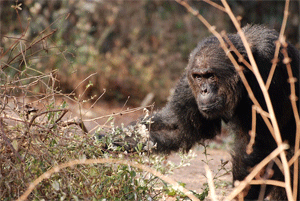by Tia Ghose, Senior Writer
Livescience.com
November 13, 2014 12:00pm ET
NOTICE: THIS WORK MAY BE PROTECTED BY COPYRIGHT
YOU ARE REQUIRED TO READ THE COPYRIGHT NOTICE AT THIS LINK BEFORE YOU READ THE FOLLOWING WORK, THAT IS AVAILABLE SOLELY FOR PRIVATE STUDY, SCHOLARSHIP OR RESEARCH PURSUANT TO 17 U.S.C. SECTION 107 AND 108. IN THE EVENT THAT THE LIBRARY DETERMINES THAT UNLAWFUL COPYING OF THIS WORK HAS OCCURRED, THE LIBRARY HAS THE RIGHT TO BLOCK THE I.P. ADDRESS AT WHICH THE UNLAWFUL COPYING APPEARED TO HAVE OCCURRED. THANK YOU FOR RESPECTING THE RIGHTS OF COPYRIGHT OWNERS.

An aggressive male chimpanzee looks on from behind a bush. A 2014 study has found that male chimpanzees that are more aggressive to females sire more offspring, suggesting that the trait may have an evolutionary basis. Credit: Ian C. Gilby
Male chimpanzees that wage a campaign of sustained aggression against females sire more offspring than their less violent counterparts, new research finds.
The results suggest that such nasty behavior from males evolved because it gave the meanest males a reproductive advantage, said study co-author Ian Gilby, a primatologist at Arizona State University in Phoenix.
This chimpanzee behavior could also provide some insight into the roots of sexual aggression in men.
"It is possible that in our early ancestors there may have been an adaptive value to male aggression against females," Gilby said.
Sex, chimpanzee style
The battle of the sexes is supercharged in the chimpanzee world. Males charge at females, rip out their hair and kick, slap or beat them. Males often kill the babies of rivals to increase the availability of females to mate again.
"Male chimpanzees can be really horrible to females," Gilby told Live Science.
To deal with this behavior, female chimpanzees play a delicate balancing act. They mate with almost all the males in a troop to create uncertainty as to who's the father of the offspring. At the same time, females want to mate with the highest-quality males when they are at their most fertile, upping the chances of producing fit offspring, Gilby said.
Sustained aggression
From an evolutionary perspective, coercive sex in the animal kingdom may be advantageous because it allows otherwise undesirable males some chance of passing on their genes. But sexual aggression in male chimpanzees isn't directly parallel to rape, because it typically takes place at times distant from copulation. Female chimps also mate with multiple males anyway, Gilby said.
To understand the roots of this behavior, Gilby and his colleagues recorded instances of male-on-female violence in a troop of chimpanzees living in Gombe Stream National Park in Tanzania. The researchers studied violence that occurred both when the females were sexually receptive, or swollen, and when they were not. The team then compared that information with paternity tests on all the offspring born since 1995.
Chimps have a strict male dominance hierarchy, and more-dominant males generally engage in a greater amount of gendered aggression. But even when taking this into account, the team found that aggression increased a male's chances of siring offspring — regardless of whether the chimp was more or less dominant.
The sustained intimidation in which chimps engage, which has some parallels to human behaviors such as stalking or domestic violence, is a form of mate guarding. The behavior may make female chimps less likely to sneak off with a partner of her choosing during her most fertile times, Gilby said.
Human behaviors?
Though the findings are in chimpanzees, they lend credence to the notion that male sexual aggression in humans may have some genetic or evolutionary basis, Gilby said.
On the other hand, drawing parallels can be perilous. Humans diverged from chimpanzees at least 7 million years ago, and the human mating system looks very different from chimps' violent, multi-male, multi-female system. Humans form pair bonds and have varied and complex mating strategies and behaviors. And most men aren't brutes to their partners.
"We definitely don't mean to say this excuses or fully explains violence in this way in humans," Gilby said.
The study's findings may provide fodder for a long-standing debate in evolutionary biology about whether rape and sexual aggression are evolutionarily advantageous in humans, said William McKibbin, an evolutionary psychologist at the University of Michigan–Flint, who was not involved in the study. No studies in humans have ever shown that rape increases reproductive success, he added.
But even if such behaviors have evolutionary roots, "this is not to say that sexual coercion or rape is natural and therefore good, or that because it's in our genes, there's nothing we can do about it. Far from it," McKibbin told Live Science. "If we can understand the biological underpinnings of abhorrent behaviors like this, we will be better able as a society to decrease the frequency of these horrible behaviors."
The findings were published today (Nov. 13) in the journal Current Biology.
